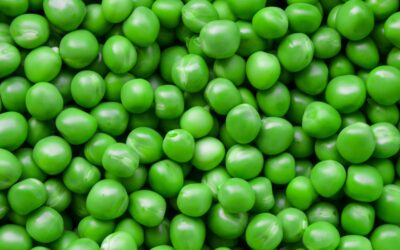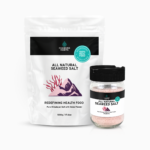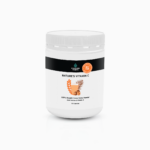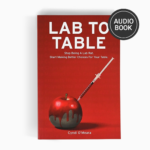At 19 years old, my Aunt Bobby gave me a yoghurt culture that she was given by a Lebanese lady. It was an old traditional culture and I treasured it. I made yoghurt in my glass thermos every other day to keep it alive. It always held its strength and the yoghurt was delicious. My glass thermos broke after many years of use and I lost the culture forever.
When Changing Habits started to sell food (salt was our first staple), I decided that I wanted to have a yoghurt culture as part of our food range. I travelled the world looking for the best. I went to one supplier, Sacco (Como) in Italy and loved the taste and the fact that they had been in business for over a century making cultures, but there was one ingredient I wasn’t happy about so continued to look.
In the Midwest of the US, I found another culture supplier that had all the ethics of Changing Habits. I was ready to run with this family business when they told me that they had just sold the business to DuPont. There was no way that I wanted to be associated with a company that large, where I didn’t have control of the cultures and what they would do to them, such as genetic modification. So, it was at this point that I stopped looking and decided to pull the pin on yoghurt.
I’m so glad now that I didn’t run with DuPont. I want to be that person that asks questions about our food suppliers. I want to make sure that everything we do is ethical and the best for the planet and the health of humans. I want to be part of the solution not part of the problem, so researching everything we bring to the market and teach is vitally important. Not only must it enhance our health, but it must be a solution to what is happening on the planet.
Recently I watched a documentary about DuPont and the poisoning of a town and community. The doco is called The Devil We Know. You can watch it here: https://youtu.be/NJFbsWX4MJM
After watching it, I was relieved that I had nothing to do with this company and I had the instinct to stay away. How could I trust them to deliver non-GMO ethical yoghurt cultures if they had lied about the poisoning of the planet?
I found this on the Australian DuPont website:
Highest ethical behavior
We conduct ourselves in accordance with the highest ethical standards, and in compliance with all applicable laws, always striving to be a respected corporate citizen worldwide.
Protecting the planet
We find science-enabled, sustainable solutions for our customers, always managing our businesses to protect the environment and preserve the earth’s natural resources—for today and for future generations.
The documentary does not show DuPont to be either ethical or protecting the planet.
Internal memos from DuPont show that they knew about the dangers of the chemical PFOA (perfluorooctanoic acid) from 1962, yet it wasn’t until 2015 that the use of it ceased. “We know this chemical is bad and we should probably replace it but there will probably be a problem with the replacement chemical.”1
The documentary is a history lesson on DuPont’s greed and irresponsibility concerning the dumping of PFOA (also known as C8) into the water supply, the continued use of the chemical even though they knew it caused health issues and birth defects, and the chemical being released into the atmosphere through smoke from their plant at Parkersburg, West Virginia. According to the documentary, they were also aware of the far-reaching extent of the poison through waterways and lands.
The Devil We Know shows a farmer, Wilbur Tennant, who in the 1980’s sold 66 acres of his land to DuPont for non-hazardous land fill. This was adjacent to their Teflon plant. Soon after, he began finding dead stock by the waterways. In 12 months, he lost 153 cattle. He tried to find help in his town, but no one listened, including vets and lawyers, as it was a ‘DuPont town’, so he searched for a lawyer who would take the case. The movie Dark Waters staring Mark Ruffalo portrays his story and the subsequent investigation by the lawyer and class action.
A study conducted on 70,000 people in 2004, prompted by the class action, showed that PFOA was associated with the following conditions: kidney cancer, testicular cancer, ulcerative colitis, thyroid disease, pre-eclampsia and high cholesterol.
It’s estimated that 99.7% of the entire human population has been exposed and have PFOA in their bodies – this includes newborn babies. This chemical has been found in polar bears in the artic circle, as well as in Canadian salmon and apples, beans and other foods. It’s ubiquitous.
I’ve talked about the herbicide glyphosate and its dubious safety claims by Monsanto for the past six years. As a result, I produced the documentary What’s With Wheat?.
At the end of my documentary, I state “The story of wheat is the story of food”.
The producer of The Devil We Know says much the same thing about PFOA: “The story of PFOA is the story of the 88,000 chemicals that are safe until proven otherwise”.
The system for the regulation of chemicals that are used in industry, sprayed on agriculture and put into our foods is broken. Most people believe if it’s on the shelf it’s safe, but sadly that is not the case.
Teflon cooking pans have been on the shelf since the 1950’s. DuPont knew there was a problem in 1962 but it wasn’t removed until 2015. How many more chemicals will run this course?
There is something you can do. Firstly, educate yourself. In my book Lab To Table, one of the chapters is called ‘Pots, Pans and Packaging’. Many pots and pans and baking dishes are lined with Teflon, or were up until 2015 when the chemical was changed from PTFE (polyterraflouroethylene) made from PFOA to Generation X (gen X). Gen X is now showing its own issues as the DuPont internal memo indicated. I have attached an article on it in the references.
I’m an old-fashioned girl who likes old-fashioned food, cooking utensils and pans. I’m dubious about anything that hasn’t been tested or stood the test of safety and time. It’s intuitive. So in 1998, in the first edition of my book Changing Habits Changing Lives, I warned the reader not to use non-stick pans and baking dishes. Not only because of the toxic pans themselves, but because of the toxins that are produced and discarded into waterways in making this product.
What we purchase can either be a solution to the cleaning up of our planet or a problem that perpetuates the rubbishing of planet earth. Buying anything that is produced with PFOA, PFOS, PTFE and/or Generation X is perpetuating the demise of the planet and human health. While DuPont has stopped making PFOA and 3M has stopped making PFOS (think Scotchguard), there are manufacturers in China that continue to produce it.
This is not just about pots pans and packaging; other things that may contain these chemicals, which you may want to reconsider purchasing are stain and water resistant clothing, furnishings and carpets, dental floss, wet weather gear, some gortex (synthetic biology makes the rest), interior paint, car interiors, pizza boxes, firefighting foam, car washes, fast food wrappers and microwave popcorn bags. It’s even found in the International Space Station (ISS), so we are now rubbishing our universe.
If at this point, you are thinking ‘What’s the use?’, don’t give up. Instead, gain knowledge and act on it. It’s about knowing better and doing better. It’s about you being part of the solution not continuing to be part of the problem.
Please share this with your family and friends. Have a night where you watch The Devil We Know and What’s With Wheat? with a group of people that are hungry for information. Become informed and start making steps to change. Bit by bit, habit by habit, we will collectively change the world.
The money we spend will either support or not support these companies. I’m not willing to support any company that has a willful lawsuit against them like Johnson and Johnson, The Chemours Company, Pfizer, DuPont, AstraZeneca, Bayer and Monsanto, to name a few. I make it my business to know what they offer in the marketplace. They are not here to support the planet or your wellbeing so why should you support them by buying anything they produce?
There are wonderful companies that care. Seek them out and support them with your wallet instead.
References
- The documentary The Devil We Know https://youtu.be/NJFbsWX4MJM
- The documentary What’s With Wheat?
- A great interview with the lawyer, the teacher and the young man deformed by PFOA at the Sundance Film Festival 2018 https://www.youtube.com/watch?v=-v4NvQqVrF0
- The article that sparked the documentary https://www.nytimes.com/2016/01/10/magazine/the-lawyer-who-became-duponts-worst-nightmare.html
- More on GenX, the replacement to PFOA https://theberkey.com/blogs/water-filter/genx-chemical-in-drinking-water-side-effects-and-health-risks-of-genx








So cheeky the way companies employ people to use sneaky marketing tactics to basically lie through their teeth – I’m thinking specifically about the statements from their website which you shared about purported sustainability and ethical standards. It’s so common these days but can make it really complicated for the average person to sift through jargon and find truth. Thanks for the work you do in this area!
Thank you for sharing. That was a very interesting article. Recommend reading the New York Times article for a very eye-opening, in-depth expose.
Thanks Olga, we will look it up.